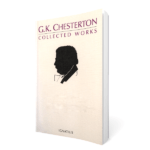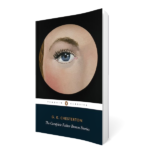We could probably consider this collection as the most autobiographical of the Father Brown stories. In them Chesterton talks about fame, about traveling to America, and about conversion. We learn that Father Brown has, all his life, “been led by an intellectual hunger for truth, even of trifles.” We see his concern for justice on a small scale and on a large scale, as he not only deals with minor complications such as murder but also is found writing a series of lectures on Rerum Novarum. We see him reflecting on good and evil, on his own triumphs, his own sins, and we even get to see him angry.
The Incredulity of Father Brown was the third of five books featuring the umbrella-toting, crime-solving cleric. It was published in 1926, twelve years after the previous book of Father Brown mysteries. In the interim, at least two things had changed. Father Brown had become famous. And Chesterton had become Catholic. But while those two facts add interest to the stories, they are only incidental to them. Some reviewers, however, did not see it that way. Suddenly they were complaining that the stories had become too religious, as if they had never noticed before that the main character was a priest.
The thread that ties these yarns together is, as the title suggests, Father Brown’s incredulity. There is in each tale an apparently supernatural event: a murder by a ghost or by an evil spirit or by a family curse, or at the other extreme, a resurrection from the dead. However, the one who is expected to believe in supernatural explanations to the shocking and mysterious events is the one who doubts such explanations. It is the priest who is skeptical about the alleged miracles while the skeptics are only too ready to believe in them. Hence, the most famous of all Chesterton’s quotations: you know, the one about the man who does not believe in God doesn’t believe in nothing but believes in anything? Yeah, that one. It comes from this book. Only it doesn’t come in the neat little package that is always quoted (and always should be quoted). It comes from putting together two different Father Brown lines from two different stories.
In The Oracle of the Dog, Father Brown says, “It’s the first effect of not believing in God that you lose your common sense and can’t see things as they are.” In the very next story, The Miracle of Moon Crescent, he tells the skeptics-turned-dupes, “You were all balanced on the very edge of belief – of belief in almost anything.” (And to give credit where credit is due, it was a couple of amateur detectives, Robin Rader and Pasquale Accardo, who solved this mystery.) (And one more parenthetical remark: these two stories, especially The Oracle of the Dog, are considered by many critics and anthologizers, to be among the very best Father Brown mysteries.)
Father Brown travels to America in these stories, no doubt because Chesterton traveled there himself a few years before they were written. If Chesterton ever shows any weakness as a writer, I must say it is when he writes dialogue for his American characters: it’s too darn eloquent. Even allowing for the fact that Americans 80 years ago probably spoke in complete sentences unlike their modern counterparts, it is still difficult to believe that any average American spoke as well as Chesterton allows him to speak in these stories. On the other hand, Chesterton is quick to distinguish them from the English. The American characters have a distinctive native spirit, “a restless fire.” In other words, they’re all Cowboys and Indians. But in any case, American millionaires make just as good murder victims as English millionaires.
Although the priest doubts the miraculous explanations for the crimes, he never doubts the possibility of miracles. “If I want any miracles,” says Father Brown, “I know where to get them.” It is natural to believe in the supernatural, he explains. The supernatural, of course, refers to both God and the Devil. Father Brown’s belief in both is always unshaken and informs both his faith and his reason. He can recognize the good man who is merely a sinner, and the bad man who wears his religion as a mask. He does not buy the false supernatural explanations for the way things happen, but neither does he buy the false scientific explanations for the way people behave: “All evil has one origin.”
But it is not merely belief in the supernatural that makes Father Brown think so clearly; it is belief in a creed. It is the rejection of the creed that makes the skeptics so malleable and rudderless. Or, to use a word more fitting to mystery stories: clueless. They are all afraid, says Father Brown, of four words: “He was made Man.” These same four words have made a few readers uncomfortable, too. But Chesterton has the most comfortable way of making people uncomfortable. He amuses them with a puzzle. He knows that every riddle wants a solution, every skeptic wants to be convinced, every criminal really wants to be caught, and every sinner wants to be forgiven.


